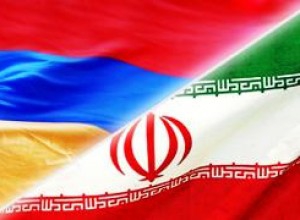 While the West has recently tightened its sanctions against Iran, its�only Christian neighbor has taken a different approach towards the�Islamic Republic. Political constraints and lack of options have�coerced landlocked Armenia to adopt a policy dissimilar to the West�s�for one basic reason � survival.
While the West has recently tightened its sanctions against Iran, its�only Christian neighbor has taken a different approach towards the�Islamic Republic. Political constraints and lack of options have�coerced landlocked Armenia to adopt a policy dissimilar to the West�s�for one basic reason � survival.Armenia is located in the South Caucasus - one of the most volatile�regions in the world, where East meets West and North meets South. It�lies at the crossroads of Islam and Christianity. This is where NATO�and the USSR once drew their boundary, but where war and history have�maintained closed borders even after the collapse of the Soviet Union�in 1991. This is also where expansive oil and gas pipelines traverse,�supplying Europe with energy resources from the hydrocarbon-rich�Caspian Sea.
Of all the countries in the region, geography and history have been�the cruelest to Armenia. The country is blockaded by two of its four�neighbors � Turkey to the West and Azerbaijan to the East and�Southwest � accounting for some eighty percent of the country�s�boundaries. Its border with an often unstable Georgia remains open to�the North as well as a tiny 22-mile Southern border with Iran � termed�as a �lifeline� for the culturally-rich yet resource-poor country of 3�million.
Despite a current cease-fire, Armenia is technically still at war with�Azerbaijan over the region of Nagorno-Karabakh, where a de-facto�independent republic was proclaimed in 1992 after Armenian forces�established control over the territory and several districts�surrounding it. As a result, Turkey also severed ties with Armenia and�closed its border in solidarity with its ethnic kin, the Azerbaijanis.�Armenia�s relations with Turkey also remain tense over the 1915�Armenian Genocide, when nearly the entire Armenian population of the�Ottoman Empire, two million people, was wiped out through massacres�and deportations. Turkey still denies the Genocide despite historical�evidence and international pressure to acknowledge the crimes
committed by its predecessors.
Given Iran�s historic rivalry with Turkey and Russia for influence in�the Caucasus, its strained relations with Azerbaijan over that�country�s rejection of an Islamic order, and its international�isolation, Iran has recently enhanced its economic, political and�cultural relations with Armenia. Additionally, northern Iran is�inhabited by over 15 million Azeris (double the population of the�Republic of Azerbaijan), driving Iran�s concern of a potential�secessionist movement. Wary of this threat, a weak Azerbaijan is in�Iran�s best interest and Armenia becomes an important leverage point�in this regard. Hence, we observe an unusual international relations�predicament in which the interests of an Islamic republic coincide�with those of a Christian state at the expense of another Muslim�country. In response, leaders of both Iran and Armenia are quick to�point out the historic relations between the two countries that span�several thousand years, as well as the presence of a substantial�Armenian community in Iran numbering 150,000. Two seats in the Iranian�Parliament are appointed for Armenian representation and northern�Iran, once a part of several Armenian kingdoms, is also home to�ancient Armenian monasteries designated as UNESCO World Heritage Sites�that enjoy national and international protection � in stark contrast�to some three thousand Armenian churches in Turkey that fell victim to�cultural destruction during and after 1915.
Ultimately, for Armenia, embracing Iran becomes a matter of basic�survival, and for Iran, tiny Armenia becomes an outlet for global�reconnection and a means to put pressure on Azerbaijan. Meanwhile,�Armenia has made it clear that this relationship does not come at the�expense of its relations with the West or Russia. Russia remains�Armenia�s strategic ally and Armenia has very warm and developing�relations with the United States and the EU. Large and influential�Armenian Diaspora communities, particularly in the United States and�France, become an important bridge between their ancestral and adopted�homelands and act as catalysts for Westernization. Over the years,�Armenia has espoused a policy of European orientation and integration
and hopes to become an EU member in time. As a means of engaging�regional and global powers without having to �pick and choose��alliances, Armenia has carefully crafted a policy of �complementarity��to survive and navigate difficult geopolitical terrain.
Last year marked the apex of Iranian-Armenian relations when the two�countries embarked on important economic projects, including the�construction of a hydro-electric plant on their shared border � a�welcome development for energy-hungry Armenia. There are talks now of�constructing an ambitious railway system and an oil pipeline between�the two countries. Both projects could eventually be extended to�Europe through Georgia, which will help alleviate Armenia�s isolation�in the region. American tolerance of these growing ties still remains�to be seen. Thus far, the United States has been cautious but largely�understanding; however this could change in the future.
In order to keep Iranian-Armenian relations in check and to assist�Armenia in expanding its options in the region, the Obama�administration must put pressure on Turkey to open its border with�Armenia immediately and without preconditions. This would ensure�Armenia�s access to Europe and beyond through Turkish territory. The�United States should also enhance its efforts in bringing forth a�solution to the Nagorno-Karabakh conflict peacefully and resolutely.�Furthermore, the United States should assist Armenian integration in�regional economic and transportation projects and to energize�U.S.-Armenia economic relations via a bilateral Trade and Investment�Framework Agreement. The United States will thus help Armenia reduce�its dependence on Iran by ensuring the country�s integration with the�West. Armenia and its people want no less and need American and�European assistance to achieve this objective. Otherwise, Armenia will�have no choice but to continue looking to Iran.
By�Times.am
The Iran Project is not responsible for the content of quoted articles.











